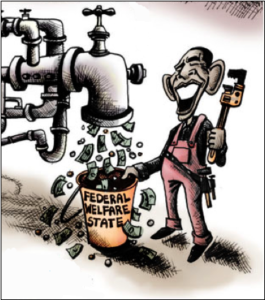
Pastors talked about it in sermons, and neighbors worried about how the uncertainty of what might occur could possibly affect them.
As the home to the largest number of federal workers and other contractors reliant upon the government, the echo chamber has been working overtime. And a dangerous echo chamber it is.
Elected representatives from across the country might go home on the weekends, but so does their Washington, D.C. staff, and while the younger staff members are somewhat insular in their almost college-like existence, older professional staff have homes, spouses and live outside Capitol Hill.
The impact of these local lobbyists providing their anecdotal fears about the impact of budget cuts is enormous, as Hill staff will often make the mistake of believing that what they hear in Falls Church, Virginia has any relation to what the public discourse is in Peoria.
The natural human reaction in this case is wrong as the bias of the Washington, D.C. area residents will always be skewed toward dramatically higher spending, whereas, the opposite bias toward less government is found elsewhere around the country.
In fact, around the country, the average person remains very concerned about the size of the federal government debt, and is frustrated by D.C.’s inability the fix what seems like an obvious problem.
Here are two easy charts[1] that show how an everyday American sees our national fiscal situation.
| Federal Budget – Actual | |
| 2012 Revenues | $ 2,449,000,000,000 |
| 2012 Outlays | $ 3,538,000,000,000 |
| 2012 Deficit | $ 1,089,000,000,000 |
| National Debt as of 3/1 | $16,600,000,000,000 |
| CBO anticipated federal outlays in 2013 | $ 3,553,000,000,000 |
| Sequester Outlay Cuts | $ 54,000,000,000 |
| Federal Budget subtracting 8 zeroes and applied to a family | |
| 2012 Income | $ 24,449.00 |
| 2012 Expenditures | $ 35,389.00 |
| 2012 New Credit Card Debt | $ 10,890.00 |
| Total Credit Card Debt | $166,000.00 |
| Cuts to Budget to make ends meet | $ 540.00 |
By simply removing eight zeroes, we can see that the federal government’s sequester is effectively the equivalent of a family cutting $45 a month to get their credit card debt under control, while spending $917 more each month that gets applied to the end of year balance. This is hardly a recipe for getting the national debt under control.
This is even more sobering when you realize that according to the CBO, federal government expenditures are expected to go up by $15 billion in spite of the sequester “cuts”.
| The Federal Government, even with Sequester expects to spend more in 2013 than in 2012 | |
| 2012 Outlays | $ 3,538,000,000,000 |
| CBO anticipated federal outlays in 2013 | $ 3,553,000,000,000 |
Ironically, revenues are anticipated to increase dramatically in 2013 due to tax increases that were part of the fiscal cliff deal with the CBO guessing that they will increase to $2.7 trillion from $2.45 trillion in 2012.
Perhaps with taxes having gone up so dramatically in January, it is time for a balanced approach to the budget by going beyond a sequester that actually results in cutting actual government spending in 2013.
Just maybe it is time for the American family to set priorities, tighten our belts and actually make choices about what government programs are “necessities” and which are “wants”, and make cuts accordingly. Failure to act now, only makes the overall credit card debt grow even more ominous, especially when that special low, interest rate could start returning back to its 5 percent norm from the current 2 percent discounted level.
On a final note, until 2013, the tax rate has remained constant for close to a decade, so the drop in tax revenues since their high water mark in 2007 was due to fewer people working and paying taxes rather than some people getting a special deal. In that same period from 2007 forward, federal government spending has increased by $800 billion a year on average.
Just one more bit of evidence that our nation has a credit card spending addiction, not a tax revenue deficiency. It is time for Obama and Congress to stop messing around, ignore the D.C. echo chamber, and do what is right for the country. It is time to go beyond sequester and impose real budget cuts that will return our nation to solvency.
Rick Manning (@rmanning957) is the Vice President of Public Policy and Communications for Americans for Limited Government
[1] Federal revenue, outlay and deficit numbers courtesy of Congressional Budget Office






